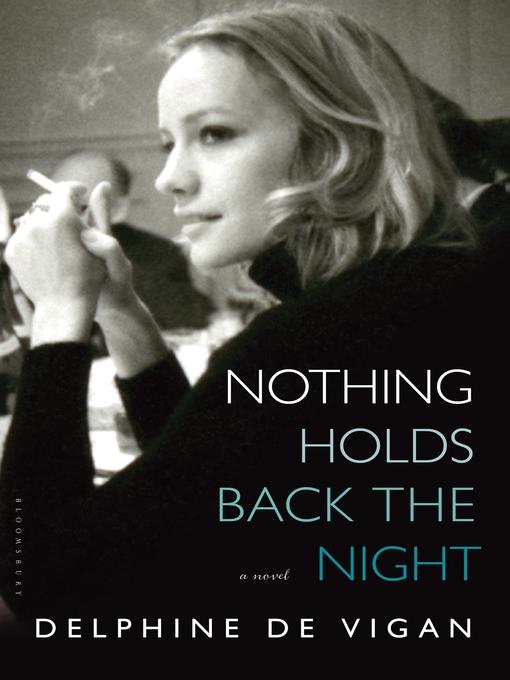
Nothing Holds Back the Night
A Novel
- اطلاعات
- نقد و بررسی
- دیدگاه کاربران
نقد و بررسی

November 4, 2013
De Vigan’s latest novel (following Underground Time) is a fervent, autobiographical examination of the volatile life of her mother, Lucile, who committed suicide in 2008. “Every day that passes I see how difficult it is to write about my mother, to define her in words, how much her voice is missing.” Writing about Lucile after her suicide is a daunting task, but De Vigan feels compelled to tackle it, hoping to identify the catalyst of her mother’s enduring torment. Lucile rises up from the page, aided by testimony from relatives, recordings, photographs, and her daughter’s memories. Born into a large clan, Lucile’s beauty is so arresting that, as a child, she becomes a model. Yet she encounters devastating loss at a young age with the death of one of her brothers, Antonin, leading to a later stint in a psychiatric hospital. Lucile becomes pregnant with Delphine at age 18, marries the father, Gabriel, and attempts to be a conventional mother. At age 26, however, she divorces Gabriel and embraces a peripatetic existence. As De Vigan contemplates her mother’s troubled life, she overcomes her trepidation and finds the fortitude to continue writing, making for a striking personal journey.

December 15, 2013
Prompted by her mother's suicide, a French author delicately combines memoir, biography and fiction to explore her family's increasingly dark psychology. The book has sold an estimated half a million copies in France. Initially, after de Vigan (Underground Time, 2011, etc.) discovered the corpse of her mother, Lucile Poirier, she resisted the idea of writing about her but eventually felt she had no choice. Drawing on the testimonies of family members, as well as letters, photos and home movies, she assembled this disturbing account of her sensitive mother's life growing up in a large, affectionate, but complex family in post-World War II France. Unusually beautiful, Lucile was a successful child model and star, but her fame fed a desperate wish for invisibility and peace, neither of which were often available in a home with eight siblings. An initially sunny family portrait slowly darkens after an accidental drowning, an asphyxiation, then suicides and suggestions of incest. Pregnant at 18, Lucile marries the baby's father and gives birth to Delphine, then has a second child, but the marriage only lasts eight years. Delphine, growing up aware of her mother's fragility, must cope when Lucile's mental health finally collapses. Constantly trying to separate truth from fable and family myth, the author treads carefully, conscious of sensitivities and her own uncertainties, while tracing events to their tragically preordained conclusion. Sympathy and sadness infuse this compelling investigation in which the author herself plays a difficult role.
COPYRIGHT(2013) Kirkus Reviews, ALL RIGHTS RESERVED.

Starred review from January 1, 2014
Though billed as a novel, this book is very much a memoir. As the author seeks to come to terms with her mother Lucile's suicide, she interviews relatives in order to imagine Lucile's childhood in a large family touched by tragedies--the deaths of two siblings, another born with Down syndrome, and possible sexual abuse by their father. This part of the story is the most novelistic, though it is occasionally interrupted by reflections on the process of uncovering and interpreting information, creating a kind of detective story. Then the focus shifts to Lucile's struggle with mental illness, her hospitalization and its effects, and especially her inability to care for her two daughters. Lucile emerges as a fascinatingly complex woman struggling to conquer her demons and even finding success for long periods but ultimately succumbing to despair in the face of physical illness. The author's deep love, rage, frustration, and grief are moving and palpable. VERDICT Recommended for fans of memoirs looking to understand family mental illness, such as Kathleen Finneran's The Tender Land.--Evelyn Beck, Piedmont Technical Coll., Greenwood, SC
Copyright 2014 Library Journal, LLC Used with permission.

March 1, 2014
Award-winning French novelist de Vigan combines memoir with fiction in this gripping exploration into her mother's troubled life. After 61-year-old Lucile commits suicide, de Vigan sets out to tell Lucile's difficult story in an attempt to uncover, and understand, the genesis of her despair. We see Lucile as the third child in a family of 11 raised by unorthodox parents who regard her as an enigma. She becomes a child model, then marries at 18, and soon after gives birth to de Vigan. The marriage doesn't last, and Lucile raises de Vigan and her younger sister as a single mother. Their upbringing is an unconventional one, punctuated by the tormenting effects of Lucile's escalating battle with mental illness, in which periods of calm are followed by profound episodes of darkness. The narrative alternates between Lucile's tale and de Vigan's worries over the damage Lucile's ordeal may cause her living relatives, particularly when disturbing family secrets are revealed. De Vigan's self-doubt is an undercurrent throughout, offering a raw perspective on mental illness and the veil of family myth.(Reprinted with permission of Booklist, copyright 2014, American Library Association.)




دیدگاه کاربران